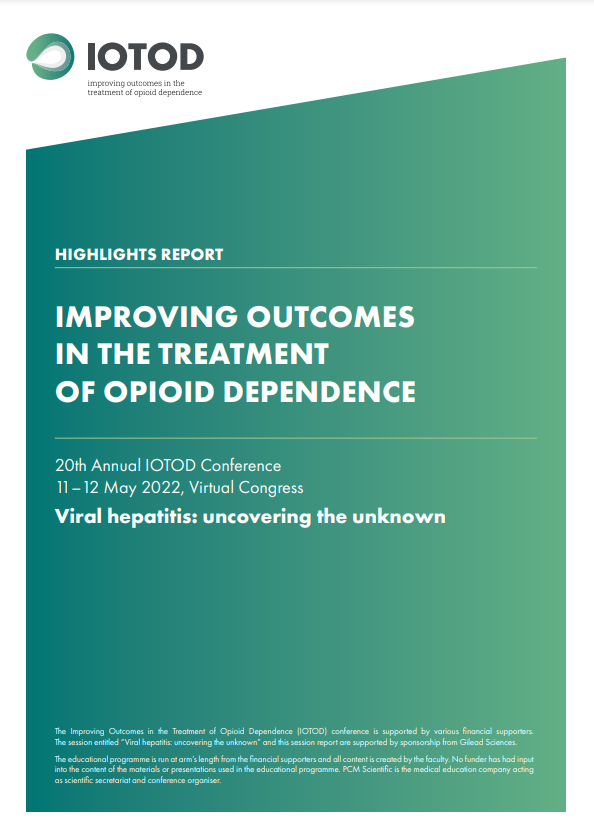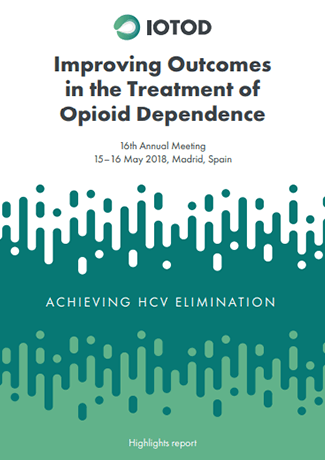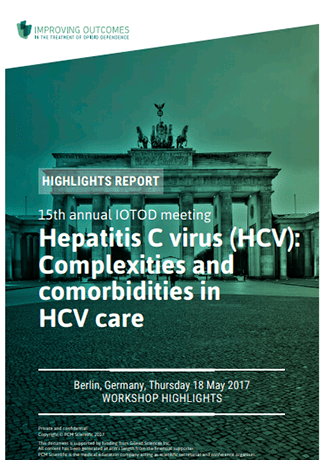IOTOD hosts a selection of webcasts from the IOTOD conference that you can access for free to improve your knowledge in opioid dependence care, hepatitis C treatment, overdose prevention and much more.
We will be adding more webcasts following the next IOTOD conference, sign up to the newsletter to ensure you don’t miss the next release!
The Time is Now
Mr Charles Gore
Providing a powerful summarisation of the current HCV landscape, Mr Charles Gore opens the workshop with a powerful call to action for addictions clinicians.
New Developments in HCV Treatment
Professor Graham Foster
Looking at the new therapeutics available for treating HCV, Professor Graham Foster provides a dynamic, emphatic summary of contemporary treatments.
Nurse-led Hepatitis Care in Addictions Centres
Dr Ashley Brown
While it is useful to know what treatments are now available, it is also important to consider steps to successful implementation. Here, Dr Ashley Brown shares his team’s model for community-based care.
Patient Journey 1: Initial Diagnosis
Dr Hemant Shah
Join Dr Hemant Shah as we meet James, a model patient who has screened positive for HCV antibodies. In this illustrative case study, Dr Shah demonstrates key communication skills when providing an initial diagnosis of hepatitis C.
Patient Journey 2: Fibrosis Assessment
Dr Hemant Shah
After motivating James to undertake a liver fibrosis assessment, the patient and doctor reconvene to discuss the results and their implications. Alongside a refresher on relevant tests and how to interpret them, Dr Shah and James model common challenges surrounding treatment, and techniques to provide successful solutions.
Manoeuvres in the fog: drug-drug interactions in OST
Dr Stephan Walcher
Dr Stephan Walcher focuses on pharmacokinetic and pharmacodynamic drug-drug interactions (DDIs) and their consequences. He discusses DDIs associated with drugs used in the treatment of HIV, HCV and psychiatric disorders as well as strategies for avoiding adverse interactions.
Practicalities of transitioning between opioid agonist treatments
Mr Duncan Hill
Mr Duncan Hill discusses the strategies, guidelines and challenges surrounding transitioning from methadone to buprenorphine and from buprenorphine to methadone.
New horizons for treatment: translating the latest research into clinical practice
Professor Marc Auriacombe
Professor Marc Auriacombe considers the clinical impact of recent developments in opioid dependence treatment options and emerging challenges in Europe.
Tailoring behavioural interventions: emerging evidence and practical implications
Professor John Marsden
Professor John Marsden looks into the ways of tailoring interventions according to history, preference and adjusting by response.
Improving outcomes with psychosocial interventions
Dr Ed Day
Dr Ed Day focuses on the importance of providing psychosocial interventions (PSIs), reviewing the current guidelines and suggesting practical advice for PSIs.
Polydrug use: emerging challenges
Dr José Martínez Raga
Dr José Martínez Raga addresses concurrent substance dependencies in opioid-dependent patients and the emerging challenges this presents.
The current landscape of opioid overdoses and harm-reduction strategies in Europe
Isabelle Giraudon
Isabelle Giraudon provides a comprehensive overview of the current status of opioid overdoses in Europe and the currently available strategies for harm-reduction.
The provision of this video has been supported by an education grant from Mundipharma International Ltd. PCM Scientific is the medical education company acting as scientific secretariat and organiser for this programme. The activity is run at arm’s length from the financial supporter and all content is created by the faculty or scientific secretariat. The financial supporter has had no involvement in the creation or development of the educational content.
Novelties and nuances in naloxone
Dr Rebecca McDonald
Rebecca McDonald explores pharmacokinetics of differently available naloxone formulation and the different routes of administration available now and in the near future in Europe.
The provision of this video has been supported by an education grant from Mundipharma International Ltd. PCM Scientific is the medical education company acting as scientific secretariat and organiser for this programme. The activity is run at arm’s length from the financial supporter and all content is created by the faculty or scientific secretariat. The financial supporter has had no involvement in the creation or development of the educational content.
Harm-reduction strategies: reaching marginalised populations
Professor Heino Stöver
Heino Stöver presents on the different harm reduction strategies that can be used to engage marginalised populations (such as homeless people, sex workers, prisoners and many more).
The provision of this video has been supported by an education grant from Mundipharma International Ltd. PCM Scientific is the medical education company acting as scientific secretariat and organiser for this programme. The activity is run at arm’s length from the financial supporter and all content is created by the faculty or scientific secretariat. The financial supporter has had no involvement in the creation or development of the educational content.
Why bother? Building a case for HCV therap
Professor Graham Foster
Graham Foster instructs the audience on why they should take an interest in treating Hepatitis C in people who use drugs, sooner rather than later.
HCV treatment options
Dr Marc Bourlière
Marc Bourlière takes the audience through the incredible advances in treatment options for Hepatitis C in recent years, and how these advances could bring us closer to the ultimate goal of Hepatitis C elimination.
Optimising the patient pathway
Professor Olav Dalgard
Olav Dalgard discusses the barriers that prevent patients from receiving treatment for their Hepatitis C and how, by minimising the pathway to treatment, more patients can be cured.
Implications of comorbid psychiatric disorders
Dr Carlos Roncero
Dr Carlos Roncero outlines the common psychiatric comorbidities in opioid-dependent patients.
Strategies for treatment-refractory patients
Professor Wim van den Brink
Professor Wim van den Brink discusses heroin-assisted treatment.
Social issues and interventions: spotlight on homelessness
Ms Susan McCutcheon
Susan McCutcheon takes the audience through the challenges faced by homeless opioid users and provides practical tips on how the audience could tackle these issues.
Improving outcomes for the ageing opioid-dependent population
Mr Duncan Hill
Mr Duncan Hill discusses the importance of screening older opioid-dependent patients for underlying comorbidities and personalising treatment accordingly.
Demystifying complexities of opioid dependence related to chronic pain
Dr Yasir Abbasi
Dr Yasir Abbasi talks about the challenges of identifying and managing patients with opioid analgesic dependence (OAD) and describes how these challenges can be overcome.
The arrival of new psychoactive substances: how they are affecting opioid-dependent patients
Dr Stephan Walcher
In this talk, Dr Stephan Walcher describes the European landscape and management options of new psychoactive substances.
Refining abstinence-based pathways
Professor Jens Reimer
In this talk Professor Jens Reimer describes abstinence-based pathways for stable opioid-dependent patients who are highly motivated to cease opioid use.
Long-acting formulations: a paradigm shift in treatment?
Professor Nicholas Lintzeris
Professor Nicholas Lintzeris distinguishes between buprenorphine (BPN) depot products and discusses the role of depot BPN in clinical practice.
People who use drugs: what do they think about pharmacotherapy?
Dr Magdalena Harris
Dr Magdalena Harris discusses how to critically reflect on the impact of context when deciding with clients on opioid dependence prescribing options.
Implementing supervised consumption rooms in Europe: logistics, challenges and results
Dr Elisabeth Avril
Dr Elisabeth Avril describes the growing evidence to support the positive impact of supervised drug consumption rooms for individuals and communities affected by injecting and/or overall drug use.
Reducing overdoses with take-home naloxone: lessons learnt from peer-to-peer distribution
Mr Mat Southwell
Mr Mat Southwell recalls the characteristics, challenges and opportunities of peer-to-peer and take-home naloxone programmes.
For better or for worse–decriminalisation of drugs: outcomes from Portugal
Dr Ricardo Baptista-Leite
Dr Ricardo Baptista-Leite describes plausible approaches to achieve positive outcomes following decriminalisation of drug use, using outcomes from Portugal.
HIV among PWID: how far has Europe come?
Dr Vana Sypsa
In this session Dr Vana Sypsa describes the situation regarding HIV infection among people who inject drugs in Europe, identifies the best practices and recognises potential threats.
HCV: innovations in treatment
Professor Graham Foster
Professor Graham Foster discusses the pharmacological treatment options available for HCV treatment in people who inject drugs (PWID) and the principles of treating patients with HCV.
HCV among PWID: are we on track for elimination?
Dr Ashley Brown
Dr Ashley Brown discusses the value of improving hepatitis C virus (HCV) screening and treatment uptake for all opioid-dependent patients, from treatment entry and as appropriate throughout their treatment journey.
COMPLEX CASES: PANEL DISCUSSION
Mr Duncan Hill, Dr Stephen Walcher, Professor Nicholas Lintzeris
“In this session chaired by Professor Graham Foster, 8 complex cases of opioid dependence are discussed with Mr Duncan Hill, Dr Stephen Walcher and Professor Nicholas Lintzeris.”
PATIENT PROFILES: PAST AND PRESENT
Professor Catriona Matheson, Professor Adrian Dunlop, Dr Stephan Walcher
- The changing patient profile and their co-morbidities: consequences for opioid dependence treatments
- Gender disparities in ODT: addressing the varied needs of women
- How to treat the poly-addicted opioid-dependent patient
OPIOID ANALGESIA DEPENDENCE MANAGEMENT: ARE WE DOING ENOUGH?
Ms Cathryn Kemp, Professor Maurice Dematteis
- Perspectives from a former opioid analgesic dependent patient
- Opioid dependence treatment and chronic pain management – can I do both?
SEEING THE WHOLE PATIENT: MENTAL HEALTH AND PSYCHOSOCIAL TREATMENTS
Professor Oscar D’Agnone, Professor John Marsden, Mr Duncan Cairns
- Mental health co-morbidities and their influences on opioid dependence treatment
- Latest research – psychosocial treatment and opioid dependence
- Patient perspective on the significance of support – who, when, where?
A SPOTLIGHT ON ODT – WHAT, WHEN AND WHY?
Professor Nicholas Lintzeris, Dr Michael Frost, Mr Duncan Hill, Professor Trish Hafford-Letchfield
- ODT 101: a refresher
- ODT provision – shifts in formulation in a changing world
- DDIs in ODT: co-morbidities and adverse drug reactions
- ODT providers – who are they and how do they work together?
VIRAL HEPATITIS: UNCOVERING THE UNKNOWN (SUPPORTED BY GILEAD)
Professor Graham Foster, Professor Heino Stöver, Professor Ashley Brown
- The “known knowns”
- The “unknown knowns”
- The “unknown unknowns”
- Panel discussion and commitments to change
COMPLEX CASES
Professor Graham Foster, Professor Maurice Dematteis, Mr Duncan Hill, Dr Stephan Walcher
- Complex cases: panel discussion



